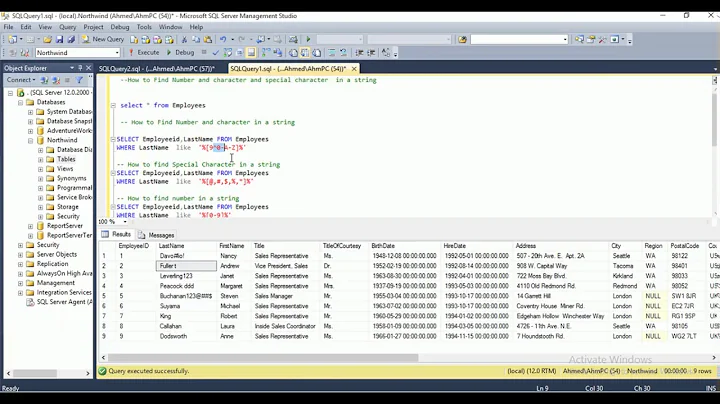Using find and tar with files with special characters in the name
Solution 1
Use the -T feature of tar to tell it to read the list of files from another file (tar treats each line as a separate file).
You can then use <() notation to have your shell generate a pseudo-file from the output of a command:
tar cf ctlfiles.tar -T <(find /home/db -name "*.ctl")
If your shell does not support <() notation, you can use a temporary file:
find /home/db -name "*.ctl" > ctlfile-list
tar cf ctlfiles.tar -T ctlfile-list
rm ctlfile-list
Solution 2
You can use the -print0 feature of find with the -0 feature of xargs, like this:
find /home/db -name '*.ctl' -print0 | xargs -0 tar -cf ctlfiles.tar
-print0 (that's hyphen-print-zero) tells find to use a null as the delimiter between paths instead of spaces, and -0 (that's hyphen zero) tells xargs to expect the same.
Edited to add:
If you have a large number of files, xargs may invoke tar more than once. See comments for ways to deal with that, or make find invoke tar directly, like this, which works with any number of files, even if they have spaces or newlines in their names:
rm -f ctlfiles.tar
find /home/db -name '*.ctl' -exec tar -rf ctlfiles.tar {} +
Solution 3
When the argument following "-T" is "-", the list of files is taken from stdin. Recent versions of tar typically support the "-null" option, which indicates that the files given in the source specified by the "-T" option are null-separated.
Hence the following works with an arbitrary number of files, possibly containing newline characters:
find /home/db -name '*.ctl' -print0 | tar --null -T - -cf ctlfiles.tar
Related videos on Youtube
Admin
Updated on September 17, 2022Comments
-
 Admin over 1 year
Admin over 1 yearI want to archive all .ctl files in a folder, recursively.
tar -cf ctlfiles.tar `find /home/db -name "*.ctl" -print`The error message :
tar: Removing leading `/' from member names tar: /home/db/dunn/j: Cannot stat: No such file or directory tar: 74.ctl: Cannot stat: No such file or directoryI have these files: /home/db/dunn/j 74.ctl and j 75. Notice the extra space. What if the files have other special characters? How do I archive these files recursively?
-
R Samuel Klatchko almost 14 yearsThat will fail if
xargsdecides that it has too many arguments are wants to run the command multiple times. -
Andrew almost 14 yearsTrue, but I believe adding the -r option to tar should fix that.
-
Andrew almost 14 yearsIn fact if you use -r, you could probably dispense with xargs and let find invoke tar directly, like this: find /home/db -name '*.ctl' -exec tar -rf ctlfiles.tar {} \; Although in practice, the original answer would likely work -- if the number of files isn't in the thousands -- and would invoke tar once instead of N times.
-
 Sophie Alpert almost 14 yearsYou could also set the number with
Sophie Alpert almost 14 yearsYou could also set the number withxargs -0 -n 1000000000000and then as long as you have less than a trillion items, you'll be set. -
John almost 14 yearsThis fails if a filename contains a newline. Rare but possible.
-
R Samuel Klatchko almost 14 years@davisre - good point
-
akira almost 14 yearsthe first part of the answer does not work because you pipe "names" as content to tar and not "filenames which tar has to put into the tarball". the xargs thing and executing tar for each found file (as suggested in the 2nd part) is unneeded.
-
akira almost 14 yearsthis is the right answer, it tells one instance of tar to read the filenames needed to get the content from stdin. @davisre: i tried to create a filename in zsh with ctrl-v-enter, this creates a \r and this solution still works. maybe with a \n it does not work but i think that is pretty rare to have such filenames, it is more probable to have unicode chars in the filenames than a \n.
-
 wchargin almost 5 years+1; this is the only safe and portable answer.
wchargin almost 5 years+1; this is the only safe and portable answer. -
 wchargin almost 5 yearsYou can fix the newline problem with
wchargin almost 5 yearsYou can fix the newline problem with--null; see David Bartlett’s answer. (This also works with arbitrary Unicode characters, as long as they use an extended ASCII encoding like UTF-8 or ISO-8859-x.) -
 wchargin almost 5 years“since it’ll invoke
wchargin almost 5 years“since it’ll invoketaronce for each file”—just change{} \;to{} +. -
Rob Davis almost 5 yearsThanks, wchargin. Updated.




